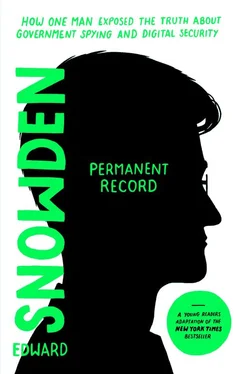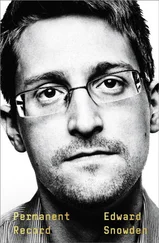A day or so later, I was home around noon, trying my best to keep up with work remotely. I was on the phone with a security officer at Dell when the dizziness hit me hard. I immediately excused myself from the call, slurring my words, and as I struggled to hang up the phone, I was sure: I was going to die.
I passed out.
I came to still seated, with the clock on my desk reading just shy of 1:00 p.m. I’d been out less than an hour, but I was exhausted. I reached for the phone in a panic, but my hand kept missing it and grabbing the air. Once I managed to grab ahold of it and get a dial tone, I found I couldn’t remember Lindsay’s number, or could only remember the digits but not their order.
Somehow I managed to get myself downstairs, taking each step deliberately, palm against the wall. I got some juice out of the fridge and chugged it, keeping both hands on the carton and dribbling a fair amount on my chin. Then I lay down on the floor, pressed my cheek to the cool linoleum, and fell asleep, which was how Lindsay found me.
I’d just had an epileptic seizure.
My mother had epilepsy, and I couldn’t believe I hadn’t associated my symptoms with hers. She’d always told me and my sister that epilepsy wasn’t hereditary, meaning passed down from your parents or grandparents, and to this day I’m still not sure if that’s what her doctor had told her or if she was just trying to reassure us that her fate wouldn’t be ours.
Very little is known about epilepsy. I consulted as many specialists as I could find. I had CAT scans, MRIs, the works. Meanwhile, Lindsay went about researching all the information that was available about the syndrome. She googled treatments so intensely that basically all her Gmail ads were for epilepsy pharmaceuticals.
I felt defeated. First my country and the internet had betrayed me. And now my body was following suit.
My brain had, quite literally, short-circuited.
It was late at night on May 1, 2011, when I noticed the news alert on my phone: Osama bin Laden had been tracked down and killed by a team of Navy SEALs.
So there it was. The man who’d masterminded the attacks of September 11, 2001, who had propelled me into the army and from there into the Intelligence Community, was now dead.
Ten years. That’s how long it had been since those two planes had flown into the Twin Towers, and what did we have to show for it? What had the last decade actually accomplished? The previous ten years had been a parade of American-made tragedy: the forever war in Afghanistan, catastrophic regime change in Iraq, indefinite detentions of foreign prisoners at Guantánamo Bay, torture, and targeted killings of civilians—even of American civilians—via drone strikes. In America, through laws like the Patriot Act, we witnessed the steady erosion of civil liberties, the very liberties we were allegedly fighting to protect. The cumulative damage was staggering and felt entirely irreversible.
I couldn’t shake the idea that I’d wasted the last decade of my life.
The biggest terrorist attack on American soil happened at the same time as the development of digital technology. Terrorism, of course, was the stated reason why most of my country’s surveillance programs were implemented. The politics of terror became more powerful than the terror itself.
After a decade of mass surveillance, the technology had proved itself to be a potent weapon against liberty. By continuing these programs, by continuing these lies, which were revealed to be largely ineffective tools to stop terrorism, America was protecting little, winning nothing, and losing much.
* * *
The latter half of 2011 passed in a succession of seizures and in countless doctors’ offices and hospitals. I was imaged, tested, and prescribed medications that stabilized my body but clouded my mind, turning me depressed, lethargic, and unable to focus.
I finally took a short-term disability leave from Dell and decamped to my mother’s secondhand couch. I don’t remember what books I tried to read, but I do remember never managing much more than a page before closing my eyes and sinking back again into the cushions. I couldn’t concentrate on anything except my own weakness. Often, I was motionless but for a lone finger atop the screen of the phone that was the only light in the room.
I’d scroll through the news, then nap, then scroll again, then nap. I primarily followed protesters across the Middle East during what came to be known as the Arab Spring. Across the region, people were living under the constant threat of violence, with work and school suspended, and had no electricity, no sewage. In many regions, they didn’t have access to even the most rudimentary medical care.
The crowds were calling for an end to oppression and censorship. They were declaring that in a truly just society, the people were not answerable to the government—the government was answerable to the people. They were rejecting authoritarianism.
In an authoritarian state, rights derive from the state and are granted to the people. In a free state, rights derive from the people and are granted to the state. Though democracy has fallen far short of its ideal, I still believe it to be the one form of governance that most fully enables people of different backgrounds to live together, equal before the law.
This equality consists not only of rights but also of freedoms, including privacy. Saying that you don’t need or want privacy because you have nothing to hide is to assume that no one should have, or could have, to hide anything—including their immigration status, unemployment history, financial history, and health records. Ultimately, saying that you don’t care about privacy because you have nothing to hide is no different from saying you don’t care about freedom of speech because you have nothing to say. Or that you don’t care about freedom of the press because you don’t like to read. Or that you don’t care about freedom of religion because you don’t believe in God. Just because this or that freedom might not have meaning to you today doesn’t mean that it doesn’t or won’t have meaning tomorrow, to you, or to your neighbor.
The young people of the Middle East were agitating for higher wages, lower prices, and better pensions. I couldn’t give them any of that. They were, however, also agitating for a freer internet.
Ever since I’d been introduced to the Tor Project in Geneva, I’d used its browser and run my own Tor server, wanting to do my professional work from home and my personal Web browsing unmonitored. Now I propelled myself off the couch and staggered over to my home office. I set up a bridge relay that would bypass the blockades the Iranian government was employing to stop its people from freely using the internet. I then distributed its encrypted configuration identity to the Tor core developers.
This was the least I could do. If there was just the slightest chance that even one young kid from Iran could now bypass the imposed filters and restrictions and connect through me online, protected by the Tor system and my server’s anonymity, then it was certainly worth my minimal effort.
I imagined this person reading their email or checking their social media accounts to make sure that their friends and family had not been arrested. I had no way of knowing whether this was what they did, or whether anyone at all linked to my server from Iran. And that was the point: The aid I offered was private.
Imagine you’re entering a tunnel. As you look down the length that stretches ahead of you, notice how the walls seem to narrow to the tiny dot of light at the other end.
Читать дальше












